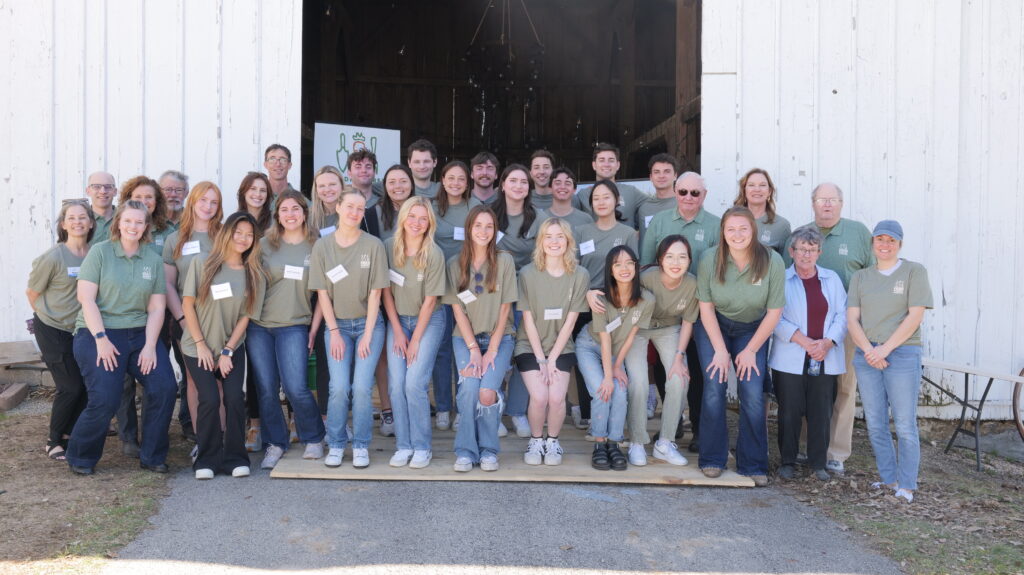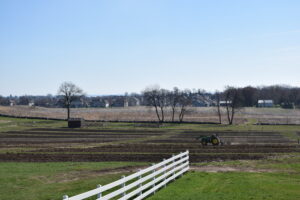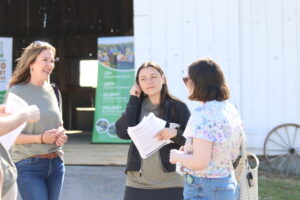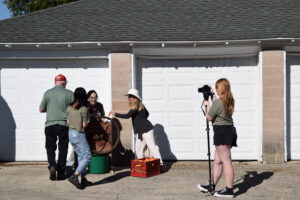
By Caroline Crowley
With the help of a communications and social media plan created by University of Wisconsin–Madison journalism students, the Madison Area Food Pantry Gardens announced that they have expanded their operations and purchased 15 acres for a new garden.
The Madison Area Food Pantry Gardens (MAFPG) is a volunteer-run, nonprofit organization that provides 30 Dane County food pantries with fresh fruits and vegetables from its gardens. Now, with this new purchase of 15 acres for its Forward Garden, the organization hopes to improve production of fruits and vegetables, create more educational opportunities and increase sustainable growing efforts. They knew they wanted to share the news about their expansion, but they weren’t sure how to get the word out.

Through their partnership with students in the School of Journalism and Mass Communication’s Public Relations Strategies course, the nonprofit was able to create a publicity plan for the addition of their new garden and sustainability efforts. “This class is an incredible asset to our nonprofit,” said Katie Schmitt, a volunteer who helped launch the project. “Being able to work with an incredibly talented group of students … we’re able not only to capitalize on their skills and their interests to learn, but hopefully we’re giving them an experience that they can take with them into a career when they graduate.”
Working on the project allowed students to directly impact Dane County residents’ lives, according to Linda Hershberger, the liaison between the course and MAFPG. By promoting MAFPG’s efforts, students helped create a solid foundation for the organization’s branding, public relations and sustainability efforts in the future, something the nonprofit hadn’t been able to do before.
“It’s definitely a win-win for our community, UW–Madison students partnering with a local nonprofit,” Hershberger said. “For me, this is the goal of the Wisconsin Idea: where education can happen through well-timed collaboration helping both parties to benefit.”
Distinguished Teaching Faculty in the SJMC and the course’s instructor, Debra Pierce, said she always tries to work with Wisconsin-based businesses and organizations with her classes to help them navigate various communications challenges. These partnerships allow students to address real-life challenges while supporting Wisconsin organizations.

“All of our advanced level strategic communication courses in the J-School are designed to be hands-on classes that get students job ready,” Pierce said. “Employers know that when they hire a Badger that comes out of our program, our students are ready to hit the ground running and to deliver real results right away in the workplace.”
The collaboration with MAFPG, however, was a greater challenge than her normal courses—in this class, students went beyond creating a communications plan. This semester, students actually implemented their plan. This meant they had to learn the course material usually taught across a semester-long course in just five weeks before creating and implementing their own ideas for MAFPG.
Jake Jennings, a senior in the course, said it was extremely rewarding to see the class’ work in action and to be able to measure tangible results.
“That’s what’s so interesting about these higher level courses that partner with actual organizations rather than just being the planning of it,” Jennings said. “Really, the teacher is giving students the platform and practice to do all these things that are just so valuable that you really honestly take for granted to an extent.”
Other students in the course, Maggie Kahn and Ari Codespoti, said the experience will be especially helpful for them when searching for jobs after graduation.
“I think participating in this whole comprehensive PR project has been an important learning experience, something that I can definitely take into whatever career that I go forward with,” Codespoti said. “I think all the pieces of this project, the communication and the teamwork and the collaboration were things that are really nurturing for learning.”
While the project was a challenge for her students, Pierce said it was a rewarding experience—the sustainability aspects of the project were especially inspiring for herself and the students in her course.
Forty-five percent of Generation Z want to work for an organization that contributes to the world in a positive way. This, Pierce said, made her especially eager to work with MAFPG.
 “When the Madison Area Food Pantry Gardens first approached me with the possibility of working together, I was really excited because I knew that my students would be really jazzed to work on a project like this, that has a real purpose and has real impact on the environment while they’re able to learn at the same time,” Pierce said.
“When the Madison Area Food Pantry Gardens first approached me with the possibility of working together, I was really excited because I knew that my students would be really jazzed to work on a project like this, that has a real purpose and has real impact on the environment while they’re able to learn at the same time,” Pierce said.
Codespoti and Kahn both agreed that working for a nonprofit organization that directly impacts their local community made completing the project more meaningful.
“I think partnering with the community just gives you a lot of motivation and insight on the course,” Jennings said.
While students in the course gained invaluable hands-on experience in the public relations, social media and creative fields, MAFPG was also able to learn more about strategic communications, allowing them to expand their efforts in the future.
“It was a good teachable moment for us, too, from the students that are in that field right now, and we could really absorb their expertise,” Darcie Van Dop, MAFPG marketing and PR specialist, said.
After spending all semester preparing for MAFPG’s media day, students garnered the attention of two local TV stations, a digital magazine, a local newspaper and a radio station. The publicity will allow the nonprofit to spread awareness about volunteer opportunities, their work on sustainability and the support they provide for local communities.